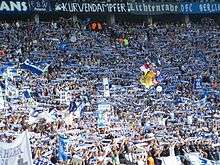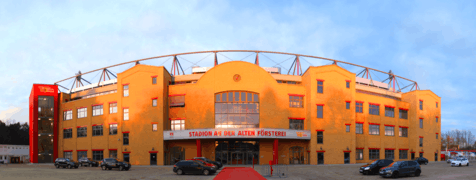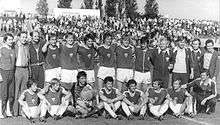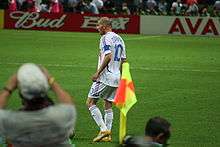Football in Berlin

Football in Berlin, the capital of Germany, has a long history. The city contributed 24 of the 86 founders of the DFB, the German Football Association. The DFB Cup Final is held every year at the Olympiastadion since 1985.
The two main football clubs in Berlin are Hertha BSC and 1. FC Union Berlin. Hertha, a founder of the DFB, were the only to play in the West German system during the Cold War. Union Berlin was founded in East Berlin.
The Olympic Stadium hosted the later stages of football at the 1936 Summer Olympics, with the other matches played at smaller grounds in the city. The ground was also a venue in the 1974 FIFA World Cup group containing both West and East Germany. The 2006 FIFA World Cup Final was held at Olympiastadion and saw Italy defeat France on penalties. In 2015 the UEFA Champions League Final was held in Berlin.
Football culture
Open Air gatherings of several hundred thousands spectators have become popular during international football competitions, like the World Cup or the UEFA European Championship. Many fans and viewers come together to watch the matches on huge video screens. The event is known as the Fan Mile and takes place at the Brandenburg Gate every two years.[1]
Clubs
Hertha BSC

Hertha BSC were founded on 25 July 1892 and were a founder member of the German Football Association (DFB) in 1900. Hertha won its only two German championships in 1930 and 1931, the latter being the last DFB league title won by a Berlin club.[2] Hertha was the most successful club in the Brandenburg football championship (1892-1933), winning on 12 occasions, including seven consecutive titles between 1925 and 1931 and the last-ever season in 1932-33 before the league's abolition by the Nazi regime.[3]
The club was a founder of the German Bundesliga in 1963, but has never won its title. They currently play in the Bundesliga following promotion after finishing champions of the 2. Bundesliga in the 2012-13 season. Hertha are a tenant of the Olympic Stadium.
In 1999–2000, Hertha were Berlin's first-ever representative in the UEFA Champions League, defeating Anorthosis Famagusta of Cyprus to qualify for the First Group Stage, where they advanced at the expense of Italy's AC Milan. In the Second Group Stage they were eliminated after finishing bottom.[4]
1. FC Union Berlin

1. FC Union Berlin were established in 1906 (despite a team of a similar name winning the German title the previous year).[5] They were runner-up in the 1923 German football championship, where they lost 0-3 in the final to Hamburger SV. During the Cold War they played in the eastern part of Berlin, the main team having left for West Berlin in 1950 to form SC Union 06 Berlin. Despite some early mild success in post-split Germany, Union were relatively unsuccessful in East Germany, frequently changing between 1st and 2nd division. They won the east German cup in 1968.
In the 1990s the club was present mostly in regional leagues (third division) and were promoted to 2. Bundesliga in 2001. After three years they were relegated twice to fourth division but won, after being promoted to third division again, 3. Liga in 2009 to reach 2. Bundesliga. Union reached the final of the 2000–01 DFB-Pokal before losing 2-0 in the final in Berlin to Schalke 04.[6]
The club plays at Stadion An der Alten Försterei, which it has occupied since 1920. The stadium can contain 22.012 people, for the most part on standing terraces. The venue became also known for events like the annual "Weihnachtssingen" (Christmas Carols Event) and the "WM-Wohnzimmer" (World Cup Living Room) in 2014.
Today, Union Berlin is well known for its enthusiastic and creative fan base and for its chant "Eisern Union" (Iron Union).[7] The club is widely recognized as one of Germany's cult clubs, based on many unique initiatives over the last two decades.[8]
BFC Dynamo

Dynamo Berlin was founded in 1953 in East Berlin as a club for the Stasi secret police force, and was refounded in 1966 following a lull of three years without competing. Due to their connections, the club had a reputation for corruption, and won a record 10 East German titles (in succession between 1977 and 1988),[9] and 3 Cups.
Dynamo are the only Berlin club to reach the semi-finals of a major European tournament. Representing East Germany, the club reached the last four of the 1971–72 European Cup Winners' Cup before losing to Dynamo Moscow of the Soviet Union in a penalty shoot-out.[10]
After a successful 2013-14 season, the club qualified for the Regionalliga Nordost[11] and moved permanently back to the stadium of its heyday, the Friedrich-Ludwig-Jahn-Sportpark.[12]
FC Viktoria 1889 Berlin

BFC Viktoria 1889 was established in 1889 and was a founder of the DFB in 1900. The club won two German championships (1907–08 and 1910–11). It was weakened by the division of Berlin during the Cold War, as only one of Berlin's clubs was permitted entry to the new Bundesliga in 1963, an honour given to Hertha.
The club won the 1893-94 German Championship on 28 July 2007, in a two-legged final 113 years after their opponents FC Hanau 93 decided not to travel 400 km to Berlin on the original occasion.[13]
In March 2013 the club announced its plans to merger with LFC Berlin. The new club competes under the name FC Viktoria 1889 Berlin, and the full the name of the new association is Fußballclub Viktoria 1889 Berlin Lichterfelde-Tempelhof e. V. The aim of the merger is to become the third club in the ongoing evolution of Berlin football, behind Hertha BSC and Union Berlin.[14] After a successful 2012-13 season, the club finished first in the Oberliga Nordost and thus qualified for the Regionalliga Nordost.
Ethnic clubs
Berlin's oldest Jewish football club, Bar Kochba Berlin, founded in 1898, merged with another, Hakoah Berlin in 1930 to form Bar Kochba-Hakoah. Under the Nazi regime, Jewish clubs were segregated in 1933 and dissolved in 1938. Jewish clubs competed in other sports from the end of the war, but it was not until 1970 that Bar Kochba-Hakoah were revived as a football club, as a member of the Maccabi World Union which encourages Jewish sport. Now competing as TuS Makkabi Berlin in the sixth-tier Berlin-Liga, the club made headlines in Germany and the Jewish State of Israel[15] in October 2006. Despite the club's low profile and the increase in tolerance in German society, the club were subjected to anti-Semitic, Neo-Nazi chants from fans and players of VSG Altglienicke.[16]
Türkiyemspor Berlin is another sixth-tier Berlin-Liga club, founded in 1978 and composed of Germans of Turkish descent. In 2010-11, it was relegated from the fourth-tier Regionalliga Nord. The name Turkiyemspor is used by other Turkish-centred clubs in Germany and abroad. Former Turkish international Ümit Karan began his career at the club. SV Yeşilyurt, another club founded by immigrants from Izmir and Istanbul, was founded in 1973 and wound up in 2007 when it merged with Berliner AK 07. AK, despite being founded in 1907, have merged with various Turkish-centred clubs in its history and since 2006 has been in partnership with the Turkish club Ankaraspor, taking on their name and colours for the 2006-07 season.
SD Croatia Berlin, of the eighth-tier Berlin Bezirksliga Division 1, was founded in 1972 for the city's Croatian community. Its futsal club won the DFB Futsal Cup in 2010 and 2011.[17]
List of current clubs
| Club | Home Ground | Capacity | Founded | Founded As |
|---|---|---|---|---|
| Berliner FC Alemannia 1890 | Sportanlage Kienhorstpark | 7,000 | 1890 | Alemannia Berlin |
| Berliner AK 07 | Poststadion | 10,000 | 1907 | Berlin Athletik Klub |
| Berliner FC Dynamo | Friedrich-Ludwig-Jahn-Sportpark | 19,708 | 1954/1966 | Football division of SC Dynamo Berlin |
| BFC Preussen | Preussen-Stadion Malteserstraße | 5,000 | 1894 | BFC Friedrich Wilhelm |
| BFC Meteor 06 Berlin | Hanne-Sobek-Sportanlage | 3,000 | 1906 | Berliner Fußball-Club Meteor 1906 |
| BSC Marzahn | Sportanlage Schönagelstraße | 1,000 | 1985 | BSC Marzahn |
| Berliner SV 1892 | Stadion-Wilmersdorf | 2,500 | 1892 | Berliner TuFC Britannia |
| BSV Al-Dersimspor | Laskersportplatz | 2,000 | 1993 | BSV Al-Dersimspor |
| Friedrichshagener SV 1912 | Sportanlage Friedrichshagen | ? | 1912 | SC Hohenzollern Friedrichshagen |
| FV Wannsee | Stadion Wannsee | 5,000 | 1896 | Männer Turnverein Wannsee |
| Hertha BSC | Olympiastadion | 74,475 | 1892 | BFC Hertha 92 |
| Hertha Zehlendorf | Ernst-Reuter-Sportanlage | 4,000 | 1903 | Turn und FC Germannia 1903 Zehlendorf |
| HSG Humboldt-Uni Berlin | Sportforum Berlin-Höhenschöhausen | ? | 1949 | Hochschulsportgemeinschaft der Humboldt-Universität |
| SV Nord Wedding 1893 | Schillerpark Ungarn Straße | 3,000 | 1893 | Berliner FC Rapide 1893 Niderschönhausen |
| SV Blau Weiss Berlin | Platz an der Rathausstraße | 3,000 | 1927 | SpVgg Blau-Weiß 1890 Berlin |
| 1. FC Lübars 1962 | Sportplatz Schluchseestraße | 500 | 1962 | 1. FC Lübars 1962 |
| SC Minerva 93 Berlin | Poststadion | 1,000 | 1893 | Berliner FC Minerva |
| SD Croatia Berlin | Friedrich-Ebert-Stadion | 12,000 | 1972 | NK Hajduk Berlin |
| SV Yeşilyurt | Hanne-Sobek-Sportanlage | 3,000 | 1973 | SV Yesilyurt Berlin |
| SCC Berlin | Mommsenstadion | 15,005 | 1898 | FC Union Halsensee |
| SC Rapide Wedding | Louise-Schröder-Platz | ? | 1893 | Berliner FC Rapide 1893 Niderschönhausen |
| SV Empor Berlin | Friedrich-Ludwig-Jahn-Sportpark | 19,708 | 1949 | BSG HO Berlin |
| Tennis Borussia Berlin | Mommsenstadion | 15,005 | 1902 | Berliner Tennis Club Borussia 1902 |
| SV Tasmania Berlin | Sportpark Neukölln | 3,500 | 1900 | Rixdorfer FC Tasmania |
| Türkiyemspor Berlin | Willy-Kressmann-Stadion | 5,000 | 1978 | BFC Izmirspor |
| TuS Makkabi Berlin | Maifeld Olympiastadion | 2,500 | 1898 | Turn- und Sportverein Makkabi Berlin |
| 1. FC Union Berlin | Stadion An der Alten Försterei | 21,717 | 1906 | SC Olympia 06 Oberschönweide |
| FC Viktoria 1889 Berlin | Stadion Lichterfelde | 4,300 | 1889/1892 | BFC Viktoria 1889/Lichterfelder FC |
Major Competitions
1936 Summer Olympic Games
Football at the 1936 Summer Olympics in Berlin saw group games and quarter-finals held at three venues in the capital: the Poststadion, the Mommsenstadion and the Stadion am Gesundbrunnen (home to Hertha between 1924 and 1974). All games after the quarter-finals were held at the Olympic Stadium, and Italy beat Austria 2-1 in the final on 15 August.[18]
1974 FIFA World Cup Group A

Group A at the 1974 FIFA World Cup featured three matches at Berlin's Olympic Stadium, all involving Chile, against West Germany, East Germany and Australia. West Germany won 1-0, although the other matches were draws. The infamous match between the two German teams, however, was played in Hamburg.
2006 FIFA World Cup Final
The 2006 FIFA World Cup Final was held on 9 July 2006 at Berlin's Olympiastadion to determine the winner of the 2006 FIFA World Cup. Italy beat France in a shootout after the match finished 1–1 after extra time. France's Zinedine Zidane was sent off in his last-ever match, for headbutting Italy's Marco Materazzi's chest in retaliation to verbal insults.
According to FIFA, 715.1 million individuals globally watched the final match of this tournament.[19] IPG's independent media agency Initiative Worldwide estimated an 260 million people viewership.[20] The independent firm Initiative Futures Sport + Entertainment estimates it at 322 million viewers.[21]
2015 UEFA Champions League Finals
In May 2013, the Olympiastadion was chosen as the venue for the 2015 UEFA Champions League Final.[22] In July 2014, it was announced that Berlin would also be the host for the 2015 UEFA Women's Champions League Final. The women's final was played at the Friedrich-Ludwig-Jahn-Sportpark.[23]
The 2015 UEFA Champions League Final was the final match of the 2014–15 UEFA Champions League, the 60th season of Europe's premier club football tournament organised by UEFA, and the 23rd season since it was renamed from the European Champion Clubs' Cup to the UEFA Champions League. It was played on 6 June 2015,[24] between Italian side Juventus and Spanish side Barcelona. Barcelona were the winners, beating Juventus 3–1 to gain their fifth trophy in the competition.[25][26]
The 2015 UEFA Women's Champions League Final was played on 14 May 2015.[27] Unlike recent years in which the Women's Champions League final was held in the same week as the men's Champions League final, the two finals were separated by almost a month.[28] German side 1. FFC Frankfurt defeated French side Paris 2–1 in the final to win a record fourth title.[29]
Berlin derbies
Main Berlin derby is between Hertha BSC and 1. FC Union Berlin.
See also
- Sport in Berlin
- Berlin Football Association
- Football in Munich
- Football in Germany
- Brandenburg football championship
References
- ↑ "500,000 spectators to watch the game together". Blogs.bettor.com. Retrieved 6 September 2012.
- ↑ http://rsssf.com/tablesd/duitchamp.html
- ↑ http://www.rsssf.com/tablesd/duithistpre45.html
- ↑ http://www.herthabsc.de/de/hertha/das-ist-hertha/ueberblick/page/351-357---.html
- ↑ http://rsssf.com/tablesd/duithistpre45.html#05
- ↑ http://rsssf.com/tablesd/duitcup01.html
- ↑ Union Berlin
- ↑ Union Berlin fans celebrate club's 50th birthday in style
- ↑ http://rsssf.com/tablesd/ddrchamp.html
- ↑ http://www.rsssf.com/ec/ec197172.html
- ↑ http://www.bz-berlin.de/sport/bfc-dynamo-steigt-in-regionalliga-auf-article1828235.html
- ↑ http://www.fupa.net/berichte/bfc-dynamo-zieht-in-jahn-sportpark-um-137303.html
- ↑ Reuters (28 July 2007). "Viktoria Berlin win 1894 final, 113 years late". ESPN.
- ↑ http://www.tagesspiegel.de/sport/berlinsport/fusion-geplant-ein-neuer-grossverein-fuer-berlin-/7867416.html
- ↑ שוב אנטישמיות בגרמניה: קריאות "גז ליהודים" לשחקני מכבי ברלין. Ynet (in Hebrew). 7 October 2006.
- ↑ Ahrens, Peter (12 December 2006). "Antisemitismus im Fußball: Milde Strafe für Judenhass". Der Spiegel (in German). Retrieved 26 February 2014.
- ↑ "Germany: National Futsal Cup". Futsal Planet.
- ↑ http://www.rsssf.com/tableso/ol1936f-det.html
- ↑ "TV Data". FIFA.com – About FIFA – Organisation – Marketing – Facts and Figures. FIFA. Archived from the original on 24 November 2009. Retrieved 24 November 2009.
The final Italy – France [had] a global cumulative audience of 715.1 million viewers.
- ↑ Bloomberg.com: International
- ↑ World Cup final ‘will vie for record of second most-watched event in human history’ « Sporting Intelligence
- ↑ "Berlin to Host 2015 Final in Olympic Stadium". Der Spiegel. 23 May 2013. Retrieved 26 February 2014.
|first1=missing|last1=in Authors list (help) - ↑ http://www.uefa.com/womenschampionsleague/news/newsid=2123817.html
- ↑ "2014/15 calendar and access list". UEFA.com. Union of European Football Associations. Retrieved 14 February 2015.
- ↑ McNulty, Phil. "Juventus 1–3 Barcelona". BBC Sport. Retrieved 6 June 2015.
- ↑ Murray, Scott. "Champions League: 9.56pm". The Guardian. Retrieved 6 June 2015.
- ↑ "Friedrich-Ludwig-Jahn-Sportpark to stage final". UEFA.com. 16 July 2014.
- ↑ "Executive Committee decides hosts for 2015 finals". UEFA. 23 May 2013. Retrieved 30 May 2014.
- ↑ "Islacker strikes to give Frankfurt the crown". UEFA.com. 14 May 2015.
External links
![]() Media related to Association football in Berlin at Wikimedia Commons
Media related to Association football in Berlin at Wikimedia Commons